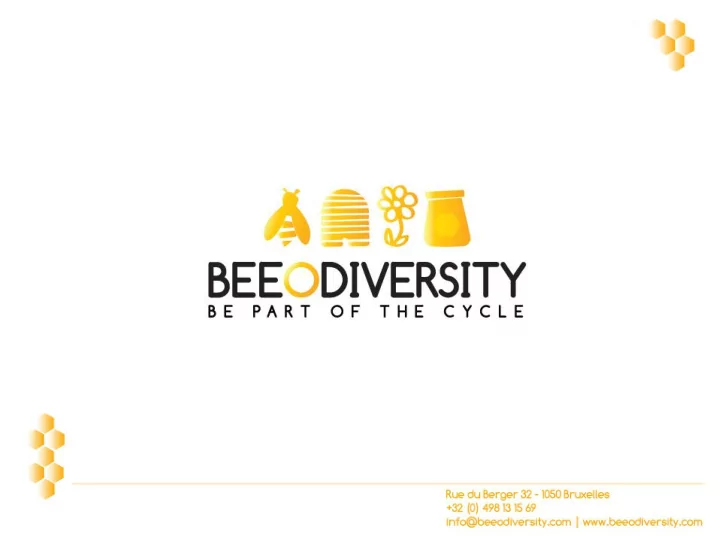

Bees are disappearing In 10 years, the Belgian mortality rate of bee colonies rose from 10% to 32%. Thanks to its strong scientific expertise, BeeOdiversity’s colony mortality rate stays under 5%. Mortality rate
Consequences of bees disappearing Bees 84% of crop species cultivated disappearing in Europe depends on insects pollinators Williams, 1994 Climate No change pollination Economic value of global pollination for the human food : 153 billion euros per year Gallai et al., 2009 Bee colonies deficit across No No fruits biodiversity Europe for a proper pollination of crops amounts to 13.4 million or seven billion bees No University of Reading, 2014 vegetables
« If the bee disappeared off the Face of the earth, man would only have four years left to live » A. Einstein Source: Whole Foods Market campaign
Who? BeeOdiversity SPRL : created in 2012 Dr Bach Kim Nguyen, the project initiator, is a world expert in bees and biodiversity. Professor at the University of Liège (Gembloux Agro-Bio Tech) and a member of national and international committees. 3 other founders with business and entrepreneurial background. Mission and objective Develop and advise projects which aim at regenerating and preserving biodiversity and bees with an innovative, global and scientific approach. Involve all the actors and raise awareness to the issue and the solutions. Objective in 2015: 10% of the surface of Belgium.
Initial business model • Production, import and sale of honey • Part of the revenues reallocated to projects for the regeneration of bees Problem: • Model based on volume & import vs. environment • Production of honey vs. well-being of bees • Low margins
New business model Objective: • Increase turnover & profit per bee colony vs. Honey (400 € ) • Increase environmental impact • Link the financial and social aspects Solution: • Purpose of bees: pollination & biodiversity development vs. honey production • Services vs. products
How? BeeOdiversity advises on proper measures to be taken to increase the biodiversity (plants, insects, agriculture, etc); BeeOdiversity grows bee colonies (300 up to know) that it places in different zones in order to develop biodiversity/food diversity/agriculture through partnerships with municipalities, companies and individuals (1 bee colony pollinates up to 700 ha which represents per year: 4 billion flowers, 1.320.000 kg of apples, 800.000 kg of pears, 128.000 kg of cherries, etc); BeeOdiversity proposes a sophisticated biodiversity dashboard based on the information gathered by its bees. The dasboard enables BeeOdiversity to monitor the environment and its evolution (e.g. pesticides, pollution, kind of plants, quality, etc) and to advise on proper measures to be taken for a better ecosystem. BeeOdiversity acts for a real change through “ social” activities (see hereunder).
Breeding bee colonies > 300 colonies Honey, Sponsoring & cosmetics & leasing of bee other products colonies Biodiversity & food diversity development projects Consultancy Leasing of Biodiversity Communication bee colonies dashboard services 1 bee colony = 700ha of biodiversity
Other actions for a real and global change Three main « risk factors » explain the decline of bee populations: • Lack of biodiversity due amongst others to the industrial agriculture; • Pesticides; • Diseases and lack of appropriate treatments. BeeOdiversity acts for a real change: • National monitoring of bee loss/decline, an ideal indicator of biodiversity; • Donation of bee colonies to beekeepers who experienced losses; • Training of beekeepers and veterinarians; • Partnerships with farmers (e.g. reduction of pesticides, new agriculture); • Scientific R & D (e.g. new treatments) in partnership with Universities (e.g. Gembloux); • Collaboration with public institutions ; • Organisation of events for biodiversity and bee preservation, e.g.: Beeweek in partnership with the EEC and the UN International Day for Biological Diversity in partnership with the UNEP (22 May)
Example of references 9
She thanks you in advance Contact details : Michael van Cutsem Tel: +32 (0)477.66.75.35 Michael.vancutsem@beeodiversity.com Bach Kim Nguyen Tel: +32 (0)498.13.15.69 Kim.nguyen@beeodiversity.com 9
Recommend
More recommend